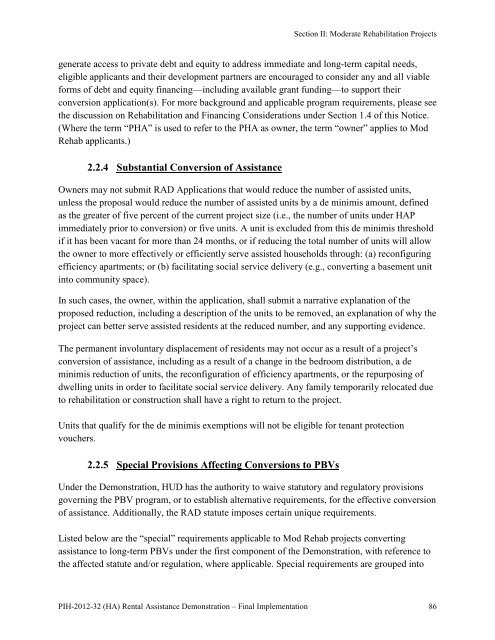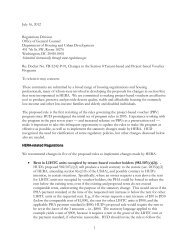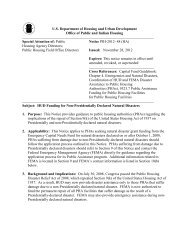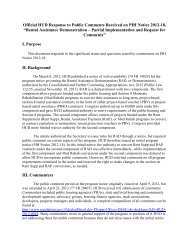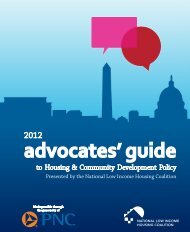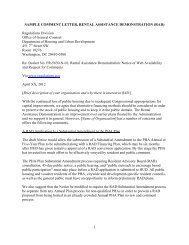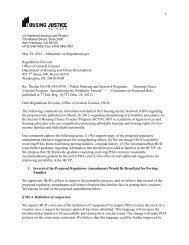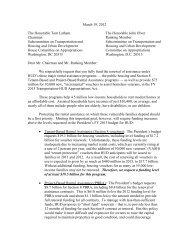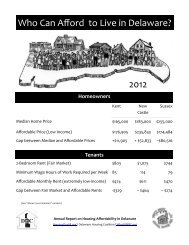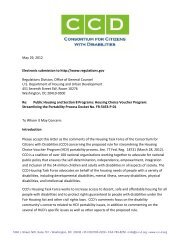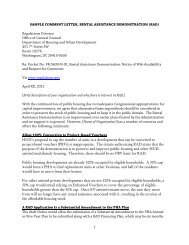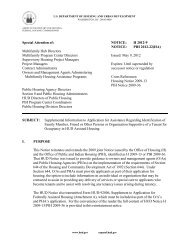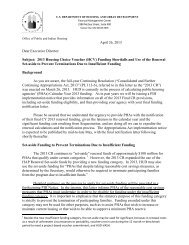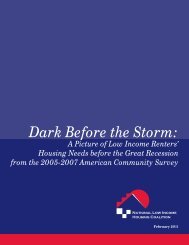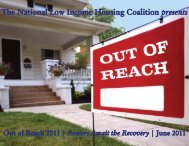RAD PIH Notice 2012-32 (.pdf, 1 MB) - National Low Income ...
RAD PIH Notice 2012-32 (.pdf, 1 MB) - National Low Income ...
RAD PIH Notice 2012-32 (.pdf, 1 MB) - National Low Income ...
Create successful ePaper yourself
Turn your PDF publications into a flip-book with our unique Google optimized e-Paper software.
Section II: Moderate Rehabilitation Projectsgenerate access to private debt and equity to address immediate and long-term capital needs,eligible applicants and their development partners are encouraged to consider any and all viableforms of debt and equity financing—including available grant funding—to support theirconversion application(s). For more background and applicable program requirements, please seethe discussion on Rehabilitation and Financing Considerations under Section 1.4 of this <strong>Notice</strong>.(Where the term ―PHA‖ is used to refer to the PHA as owner, the term ―owner‖ applies to ModRehab applicants.)2.2.4 Substantial Conversion of AssistanceOwners may not submit <strong>RAD</strong> Applications that would reduce the number of assisted units,unless the proposal would reduce the number of assisted units by a de minimis amount, definedas the greater of five percent of the current project size (i.e., the number of units under HAPimmediately prior to conversion) or five units. A unit is excluded from this de minimis thresholdif it has been vacant for more than 24 months, or if reducing the total number of units will allowthe owner to more effectively or efficiently serve assisted households through: (a) reconfiguringefficiency apartments; or (b) facilitating social service delivery (e.g., converting a basement unitinto community space).In such cases, the owner, within the application, shall submit a narrative explanation of theproposed reduction, including a description of the units to be removed, an explanation of why theproject can better serve assisted residents at the reduced number, and any supporting evidence.The permanent involuntary displacement of residents may not occur as a result of a project’sconversion of assistance, including as a result of a change in the bedroom distribution, a deminimis reduction of units, the reconfiguration of efficiency apartments, or the repurposing ofdwelling units in order to facilitate social service delivery. Any family temporarily relocated dueto rehabilitation or construction shall have a right to return to the project.Units that qualify for the de minimis exemptions will not be eligible for tenant protectionvouchers.2.2.5 Special Provisions Affecting Conversions to PBVsUnder the Demonstration, HUD has the authority to waive statutory and regulatory provisionsgoverning the PBV program, or to establish alternative requirements, for the effective conversionof assistance. Additionally, the <strong>RAD</strong> statute imposes certain unique requirements.Listed below are the ―special‖ requirements applicable to Mod Rehab projects convertingassistance to long-term PBVs under the first component of the Demonstration, with reference tothe affected statute and/or regulation, where applicable. Special requirements are grouped into<strong>PIH</strong>-<strong>2012</strong>-<strong>32</strong> (HA) Rental Assistance Demonstration – Final Implementation 86


